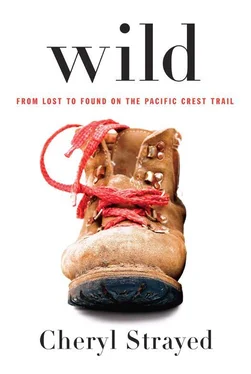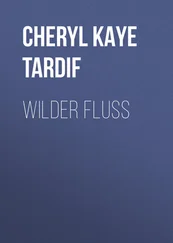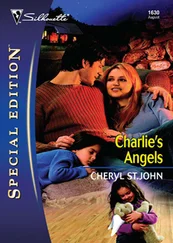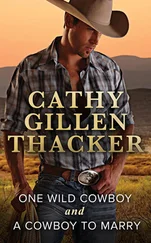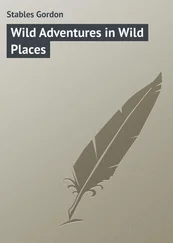Cheryl Strayed - Wild
Здесь есть возможность читать онлайн «Cheryl Strayed - Wild» весь текст электронной книги совершенно бесплатно (целиком полную версию без сокращений). В некоторых случаях можно слушать аудио, скачать через торрент в формате fb2 и присутствует краткое содержание. Год выпуска: 2012, ISBN: 2012, Жанр: Современная проза, на английском языке. Описание произведения, (предисловие) а так же отзывы посетителей доступны на портале библиотеки ЛибКат.
- Название:Wild
- Автор:
- Жанр:
- Год:2012
- ISBN:978-0-307-95765-8
- Рейтинг книги:4 / 5. Голосов: 1
-
Избранное:Добавить в избранное
- Отзывы:
-
Ваша оценка:
- 80
- 1
- 2
- 3
- 4
- 5
Wild: краткое содержание, описание и аннотация
Предлагаем к чтению аннотацию, описание, краткое содержание или предисловие (зависит от того, что написал сам автор книги «Wild»). Если вы не нашли необходимую информацию о книге — напишите в комментариях, мы постараемся отыскать её.
Wild — читать онлайн бесплатно полную книгу (весь текст) целиком
Ниже представлен текст книги, разбитый по страницам. Система сохранения места последней прочитанной страницы, позволяет с удобством читать онлайн бесплатно книгу «Wild», без необходимости каждый раз заново искать на чём Вы остановились. Поставьте закладку, и сможете в любой момент перейти на страницу, на которой закончили чтение.
Интервал:
Закладка:
“Cheryl!” Rex boomed when I walked into the restaurant. Stacy was sitting beside him, and beside her were Sam and Helen and John and Sarah, the six of them practically filling the small restaurant.
“Welcome to paradise,” said John with a bottle of beer in hand.
We ate cheeseburgers and fries, then afterwards walked through the convenience store in postprandial ecstasy, loading our arms full of chips and cookies and beer and double-sized bottles of cheap red wine, pooling our money to pay for it all. The seven of us trooped giddily up a hill to the state park campground, where we crammed our tents close together in a circle in the designated free campsite and spent the evening around the picnic table, laughing and telling story after story as the light faded from the sky. While we talked, two black bears — who actually looked black — emerged from the trees that ringed our campsite, only mildly afraid of us when we shouted at them to go away.
Throughout the evening I repeatedly filled the little paper cup I’d taken from the convenience store, gulping smooth sips of wine as if it were water until it tasted like nothing but water to me. It didn’t feel like I’d hiked seventeen miles in midnineties heat that day with a pack on my back and duct tape wound around my feet. It seemed as if I’d floated there instead. Like the picnic table was the best place I’d ever been or would ever be. I didn’t realize that I was drunk until we all decided to turn in and I stood up and it struck me that the art of standing had changed. In an instant I was down on my hands and knees, retching miserably onto the dirt in the middle of our camp. In spite of all the ridiculousness of my life in the preceding years, I’d never been sick from alcohol before. When I was done, Stacy placed my water bottle beside me, murmuring that I needed to drink. The real me inside the blur I’d become realized she was right, that I wasn’t only drunk but also profoundly dehydrated. I hadn’t had a sip of water since I was on the hot trail that afternoon. I forced myself to sit up and drink.
When I took a sip, I instantly retched again.
In the morning, I rose before the others and did what I could to sweep the vomit away with the branch of a fir tree. I went to the shower room, took off my dirty clothes, and stood under the hot spray of water in the concrete stall feeling like someone had beaten me the night before. I didn’t have time to be hungover. I planned to be back on the trail by midday. I dressed and returned to camp and sat at the table drinking as much water as I could tolerate, reading all nine of my letters one by one while the others slept. Paul was philosophical and loving about our divorce. Joe was romantic and rash, saying nothing about whether he was in rehab. Karen was brief and workaday, providing me with an update about her life. The letters from friends were a rush of love and gossip, news and funny tales. By the time I finished reading them, the others were emerging from their tents, limping into the day the way I did each morning until my joints warmed up. I was grateful that every last one of them looked at least half as hungover as me. We all smiled at one another, miserable and amused. Helen, Sam, and Sarah left to take showers, Rex and Stacy to pay one more visit to the store.
“They have cinnamon rolls,” said Rex, trying to tempt me to join them as they walked away, but I waved him off, and not only because the idea of eating made my stomach roil. Between the burger and the wine and the snacks I’d purchased the afternoon before, I was already, and yet again, down to a little less than five bucks.
When they left, I culled my resupply box, organizing my food into a pile to pack into Monster. I’d be carrying a heavy load of food on this next stretch — one of the longest sections on the PCT: it was 156 miles to Seiad Valley.
“You and Sarah need any dinners?” I asked John, who was sitting at the table, the two of us briefly alone in camp. “I’ve got extras of these.” I held up a packet of something called Fiesta Noodles, a dish I’d tolerated well enough in the early days but now loathed.
“Nah. Thanks,” he said.
I pulled out James Joyce’s Dubliners and put it to my nose, the cover green and tattered. It smelled musty and nice, exactly like the used bookstore in Minneapolis where I’d purchased it months earlier. I opened it and saw my copy had been printed decades before I was born.
“What’s this?” John asked, reaching for a postcard I’d bought in the convenience store the afternoon before. It was a photograph of a chainsaw carving of a Sasquatch, the words Bigfoot Country emblazoned across the top of the card. “Do you believe they exist?” he asked, putting the card back.
“No. But the people who do claim that this is the Bigfoot capital of the world.”
“People say a lot of things,” he replied.
“Well, if they’re anywhere, I suppose it would be here,” I said, and we looked around. Beyond the trees that surrounded us stood the ancient gray rocks called Castle Crags, their crenellated summits rising cathedral-like above us. We’d pass them soon on the trail, as we hiked through a miles-long band of granite and ultramafic rocks that my guidebook described as “igneous in origin and intrusive by nature,” whatever that meant. I’d never been much interested in geology, but I didn’t need to know the meaning of ultramafic to see that I was moving into different country. My transition into the Cascade Range had been like the one I’d experienced crossing into the Sierra Nevada: I’d been hiking for days in each before I felt I was actually entering my idea of them.
“Only one more stop,” said John, as if he could read my thoughts. “We’ve just got Seiad Valley and then it’s on to Oregon. We’re only about two hundred miles from the border.”
I nodded and smiled. I didn’t think the words only and two hundred miles belonged in the same sentence. I hadn’t let myself think much beyond the next stop.
“Oregon!” he exclaimed, and the joy in his voice almost lured me in, almost made it seem like those two hundred miles would be a snap, but I knew better. There hadn’t been a week on the trail that hadn’t been a crucible for me.
“Oregon,” I conceded, my face going serious. “But California first.”
14
WILD
Sometimes it seemed that the Pacific Crest Trail was one long mountain I was ascending. That at my journey’s end at the Columbia River, I’d reach the trail’s summit, rather than its lowest point. This feeling of ascension wasn’t only metaphorical. It literally felt as if I were almost always, impossibly, going up. At times I almost wept with the relentlessness of it, my muscles and lungs searing with the effort. It was only when I thought I couldn’t go up any longer that the trail would level off and descend.
How fabulous down was for those first minutes! Down, down, down I’d go until down too became impossible and punishing and so relentless that I’d pray for the trail to go back up. Going down, I realized, was like taking hold of the loose strand of yarn on a sweater you’d just spent hours knitting and pulling it until the entire sweater unraveled into a pile of string. Hiking the PCT was the maddening effort of knitting that sweater and unraveling it over and over again. As if everything gained was inevitably lost.
When I left Castle Crags at two — an hour behind Stacy and Rex and a few hours ahead of the couples — I was wearing boots that were a whole blissful size bigger than the last pair had been. “I’m the Bigfoot!” I’d joked as I said goodbye to the couples. I walked up and up into the searing hot day, feeling exuberant to be on the trail, the last dregs of my hangover soon sweated out of me. Up and up I went, all through that afternoon and the following day, though it wasn’t long before my enthusiasm over my new boots faded, replaced by the bleak understanding that, footwise, things weren’t going to be any different for me. My new boots had only chawed my feet afresh. I was passing through the beautiful territory I’d come to take for granted, my body finally up to the task of hiking the big miles, but because of my foot troubles, I sank into the grimmest despair. I remembered making that wish upon the star when I was with Brent in Belden Town. It appeared that I really had jinxed myself by saying it aloud. Perhaps my feet would never be okay.
Читать дальшеИнтервал:
Закладка:
Похожие книги на «Wild»
Представляем Вашему вниманию похожие книги на «Wild» списком для выбора. Мы отобрали схожую по названию и смыслу литературу в надежде предоставить читателям больше вариантов отыскать новые, интересные, ещё непрочитанные произведения.
Обсуждение, отзывы о книге «Wild» и просто собственные мнения читателей. Оставьте ваши комментарии, напишите, что Вы думаете о произведении, его смысле или главных героях. Укажите что конкретно понравилось, а что нет, и почему Вы так считаете.
